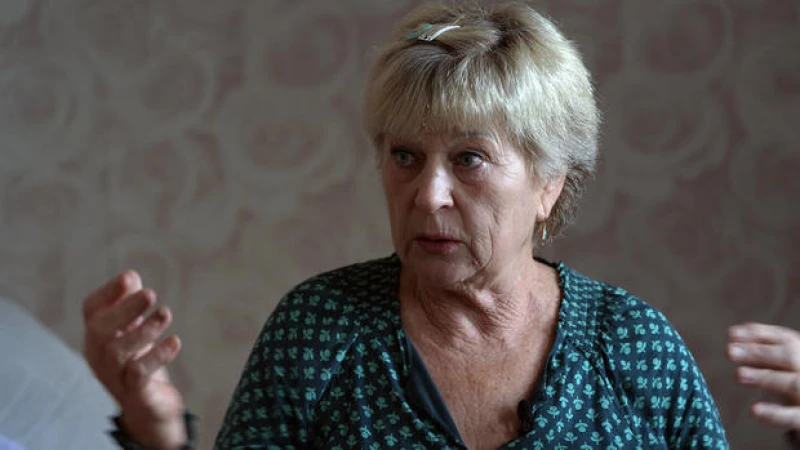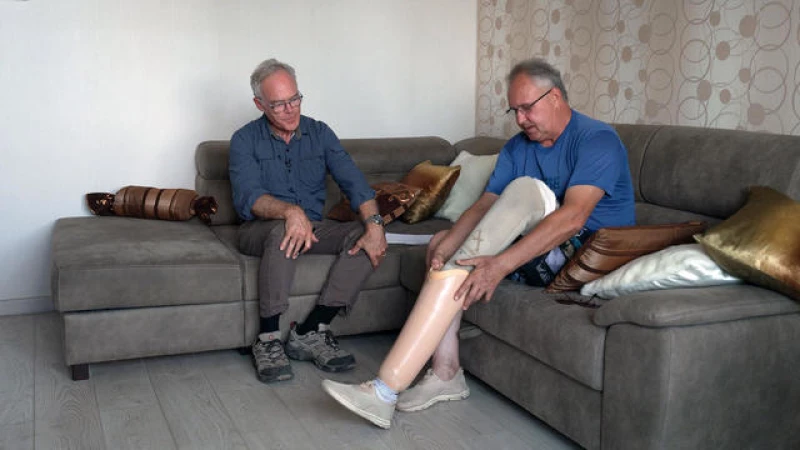A Ukrainian man thought he'd cleared his garden after he and his wife found a dozen landmines. He was wrong.
There was a 13th landmine in Ihor Bogoraz's garden at his summer home on the outskirts of Izium, one of the millions of landmines spread across Ukraine.
"I stepped on it and it exploded instantly," he said in Ukrainian. "And that's it — no leg."
Since our visit, he's received a prosthesis. His son is serving in the Ukrainian army. Bogoraz, a 61 year-old retired glassmaker, is one of more than 1,000 civilians wounded by mines in Ukraine, according to Ukrainian authorities. A massive effort is underway to find and remove the deadly weapons, but it will take a generation or more to be rid of them.
The victims of landmines in Ukraine
Serhii Nikolaiv was walking in leaves from the autumn while uncovering grapevines for the spring when he triggered a mine. If it had been green, he said he would have noticed it, but the mine was brown and blended in with the leaves.
"I stepped on it and I knew right away," Nikolaiv said in Ukrainian.
Two heart-wrenching incidents brought tragedy to Serhii Nikolaiv's doorstep. The first, his sister-in-law tragically stepped on a mine in front of her children, losing her life in the process.
Reflecting on the haunting memories, Nikolaiv expressed, "Even now, someone could drop a fork or a spoon and it makes a loud noise. And in your soul, you feel pain, and bitterness, and fear. It's a real horror,"
Seventy-year-old Lidia Borova, a widow, faced a similar fate while out foraging for mushrooms in the forest. An unsuspecting step led her to a mine, causing a devastating explosion.
Recalling the moment, Borova shared in Ukrainian, "I turned by the tree and then there was an explosion. I looked [down] at myself and I was bleeding, my arm was injured, my leg was injured. I was losing strength."
The explosion resulted in the loss of her right foot and ankle, leaving her in a critical condition. "I didn't realize how much blood I lost," she recounted in Ukrainian. "I don't know how I managed to survive."
Borova attributes her survival to the skilled hands of Dr. Yuriy Kuznetzov, a renowned surgeon in Ukraine.
Dr. Kuznetzov, hailed as a hero for his unwavering commitment during Russia's occupation, revealed that the majority of victims he treated fell prey to "petal" mines, small anti-personnel explosives that descend from the sky like flower petals. Triggered by a mere eleven pounds of pressure, these 5-inch-long mines have caused devastating harm to many.
"The person who invented them was an evil genius because they only weigh [2 ounces] but what they can do when triggered is terrifying," Kuznetzov said in Ukrainian.
Healing the victims
Dr. Kuznetzov used to see landmine victims every week or so. Efforts are underway to clear the mines, in Izium and beyond but that will take years.
The doctor has devoted half his life to Izium's Central Hospital. Many of his colleagues evacuated after the full-scale invasion began, but Dr. Kuznetzov, a native of Izium, stayed.
"When you have patients and you're the only doctor or the only person who can treat them, I didn't understand how you could leave," he said in Ukrainian.

About a week into the war, Izium's Central Hospital was bombed, crippling medical services in the city. Russia's six month occupation began a month later, and many civilians and medical staff fled. Dr. Kuznetsov stayed – and kept the hospital open.
"The best praise for me was when a woman told me in April of 2022 that 'when we heard the hospital was still open, we realized that our town had hope, it could withstand, survive, and [have a] future,'" Dr. Kuznetzov said in Ukrainian.
Izium was liberated in September 2022. Russian occupation left more than 1,000 dead and 80% of the city destroyed. Today, Izium, just 20 miles from the frontline, is contaminated with mines and unexploded ordnance. Civilians there are losing limbs from anti-personnel mines still scattered throughout the city and the surrounding villages.
One of the most difficult tasks for Dr. Kuznetzov is persuading patients in the region that they need a leg amputated after a mine accident.
"It's very difficult to explain to them that the leg is no good, no good to use," he said.
Removing the mines
While Dr. Kuznetzov helps victims, demining teams are working to remove the landmines and unexploded ordnance in Izium and beyond.
When Vasyl Solyanik found petal mines on his roof and in his garden, he dialed 101 and emergency services sent deminers Ivan Shepelev and Ihor Ovcharuk to help. All over Ukraine, the pair have found every type of munition, Ovcharuk said: anti-infantry, anti-tank, mortars, artillery shells and rockets.
Shepelev said as the Ukrainians liberated occupied territory, the Russian military left booby traps and mines everywhere including in civilian homes. Ovcharuk said bodies of dead Ukrainian soldiers were mined.

Demining work is dangerous. In 2022, a mine accident shattered Ovcharuk's kneecap. Despite the dangers, the work continues.
"We know every explosive we remove means someone's life is saved," Shepelev said.
According to Pete Smith, who leads demining efforts for HALO Trust, a charity established in 1988 to clear landmines from war zones, Ukraine is currently the most heavily mined country in the world.
"I think the scope is unrecognizable in modern times," Smith stated.
Smith took 60 Minutes correspondent Scott Pelley to a farm outside of Izium where Russian anti-tank mines were scattered. There, Pelley met HALO deminer Yulia Yaroshchuk, who was seen using a slim wand to meticulously search for tripwires in a vast field covered with tall grass. On her knees beside an active landmine, Yaroshchuk carefully moved the grass blade by blade using the wand. The day prior to their visit, a HALO deminer lost their life and two others were injured in southern Ukraine.
Pelley inquired why Yaroshchuk continues to engage in such perilous work.
"This is my contribution to victory," she replied.







